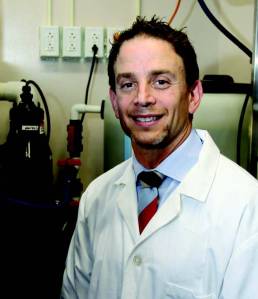his article was written by Ken Cashin for the inaugural issue of?Izaak Magazine?? an in-depth, behind the scenes, all-access publication highlighting the incredible, everyday happenings at the?IWK Health Centre. Researchers like Dr. Jason Berman are using some of the world?s most unlikely sources to find the most miraculous cures.

Zebra Fish
When it comes to medical research, inspiration can be a driving force. And, when that inspiration comes from a desire to make life better for young patients, ground breaking innovation can be born. Such is the case with Dr. Jason Berman. He is a world-leading pediatric haematologist- oncologist who runs a zebrafish research laboratory at the IWK Health Centre.
His enthusiasm and energy is contagious as he discusses his first-of-a-kind research program in Halifax with the potential to provide unique cancer drug-testing services in zebrafish to pharmaceutical companies and cancer specialists across Canada and around the world. Dr. Berman looks for such answers in zebrafish ? small striped fish that are remarkably similar to humans in their genetics and cell biology. Zebrafish are gaining international recognition in their ability to help researchers better understand human diseases. By studying blood-cell development in zebrafish, Dr. Berman and his team are hoping to pinpoint the genetic changes that lead to leukemia.
Dr. Berman treats children with cancer, including leukemia, lymphoma and solid tumours, as well as blood disorders like haemophilia and anemia. While many of his patients have acute lymphoblastic leukemia (ALL) and can be cured with current multi-agent chemotherapy, some suffer from more aggressive subtypes of ALL, such as T-cell disease (T-ALL), while approximately 20 per cent suffer from acute myelogenous leukemia (AML). Dr. Berman?s unique research approach focuses on these more difficult-to-treat forms of leukemia, using the zebrafish model to identify and test new potential treatments. ?The zebrafish is a vertebrate and shares many of the same genes with humans,? explains Dr. Berman. ?Because they are fertilized externally, are transparent, and reproduce in large numbers, they are a very useful tool for studying how changes in genes affect both normal development and the abnormal development that can result in diseases like cancer.?
Dr. Berman and his team are currently testing different compounds in several cancers including: T-ALL, AML and sarcomas (common bone tumours in children) to identify new drugs or combinations that stop and reverse the abnormal cancer growth and kill the cells that start the cancer. ?In 2012, most children with cancer have a very good chance of cure, but often at the significant cost of toxic treatments with lots of complications,? says Dr. Berman. ?By better understanding the genetic and molecular factors underlying particular diseases using rapidly evolving technologies and innovative model systems like the zebrafish, we will be able to provide better, more personalized and targeted treatment that will result in improved outcomes and fewer side effects.?

Dr. Jason Berman
Reviewed by an international panel by the Beatrice Hunter Cancer Research Institute, Dr. Berman received Cancer Care Nova Scotia?s Peggy Davison Clinician Scientist Award in May 2011, which provides $100,000 per year for three years to build cancer research programs. Previously held by only one other individual, funding through this prestigious award is helping Dr. Berman use the zebrafish to study white blood cell development, mast cell biology, leukemia and solid tumours. The award, he says, is a great tribute to both pediatric oncology and the zebrafish model and demonstrates the support, faith and encouragement that Cancer Care Nova Scotia has in the potential of his research program to impact the future for cancer patients. ?This award enables us to attract the best and the brightest from across Canada and beyond to work with us and establish our laboratory as an international centre of research excellence, fostering the training of the next generation of leading cancer researchers right here in our province.?
He says it gives hope to children who have to endure the challenges of chemotherapy. One such child is Olivia Mason, daughter of Tammy and Barry Mason of Bedford, N.S., who has been a patient of Dr. Berman?s since being diagnosed with AML in February 2011. ?We know first-hand the struggles that children endure going through intensive chemotherapy to treat AML. The current treatment is very difficult and it is heartbreaking to watch your child endure this illness and treatment,? the Masons commented through Cancer Care Nova Scotia. ?Olivia is strong and determined. We know she will make it.
However, we anxiously await the day that Dr. Berman, and his team, announce that they have found an easier way to treat AML. With the Peggy Davison Award to Dr. Berman, we know that they are one step closer to that announcement.?
Make a gift?to the IWK Health Centre Foundation.
Like this:
Be the first to like this.
Source: http://iwkfoundation.wordpress.com/2013/01/24/how-innovation-is-born/
chris brown cam newton danielle fishel FedEx Gabriel Aubry halle berry cyber monday deals
No comments:
Post a Comment
Note: Only a member of this blog may post a comment.